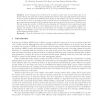688 search results - page 6 / 138 » Network Coding Protocols for Secret Key Distribution |
136
click to vote
INFOCOM
2010
IEEE
15 years 1 months ago
2010
IEEE
—Generating a secret key between two parties by extracting the shared randomness in the wireless fading channel is an emerging area of research. Previous works focus mainly on si...
171
Voted
TIFS
2010
15 years 28 days ago
2010
—The multipath-rich wireless environment associated with typical wireless usage scenarios is characterized by a fading channel response that is time-varying, location-sensitive, ...
118
click to vote
PKC
2009
Springer
16 years 3 months ago
2009
Springer
A key exchange protocol allows a set of parties to agree upon a secret session key over a public network. Two-party key exchange (2PKE) protocols have been rigorously analyzed unde...
125
click to vote
AINA
2004
IEEE
15 years 6 months ago
2004
IEEE
A key agreement protocol is utilized in a network system such that two users are able to establish a commonly shared secret key. Entities within the same security level can commun...
144
Voted
CCS
2007
ACM
15 years 8 months ago
2007
ACM
A group key agreement protocol (GKA) allows a set of players to establish a shared secret key which can be used to secure a subsequent communication. Several efficient constantrou...

